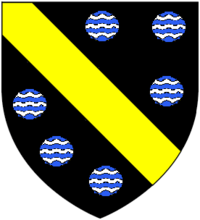Charles Stourton, 8th Baron Stourton

Charles Stourton, 8th Baron Stourton (c. 1520-1557) was an English peer, who was executed for murder.
Life
He was the son of William Stourton and Elizabeth Dudley, daughter of Edmund Dudley, adviser to Henry VII. His parents' marriage is said to have been unhappy, due to his father's liaison with Agnes ap Rhys, or Rice, daughter of Rhys ap Gruffydd and granddaughter of Thomas Howard, 2nd Duke of Norfolk; in later years his parents lived largely apart. To the understandable chagrin of his children, William left almost the whole of the Stourton inheritance to Agnes Rice, resulting in years of litigation between his children and Agnes. Charles was on very bad terms with his father, calling him a "false hypocrite" for whom prison would be too good.
Stourton succeeded his father as baron in 1548. He was a nephew of John Dudley, 1st Duke of Northumberland, as well as a Catholic. A Wiltshire resident, he was asked for help by Mary Tudor in the succession crisis of 1553, but hesitated in supporting her until her victory was clear.[1] In August 1553 he was described as an "archpapist" by a London pamphleteer.[2] He had a reputation for being quarrelsome and violent, and was clearly regarded as a public nuisance even before he was charged with murder. The legal difficulties, and family quarrels, caused by his father's affair with Agnes Rice, may to some extent explain his violent temper, although lawsuits over property were then an everyday part of life among the English landed classes.
Execution for murder
He was executed, as were four of his servants, on 16 March 1557 at Salisbury for murdering two men, William Hartgill and his son John Hartgill, following a trial at Westminster on 28 February previous. Stourton had been most reluctant to plead, until he was reminded by the judges that he faced the penalty of peine forte et dure if he did not.
William Hartgill, described as a "surly and cross old man", was a neighbour and family connection with whom Stourton had long been on bad terms. Stourton had quarreled with his widowed mother, who wished to remarry, and Hartgill had taken Lady Stourton's part in the quarrel. As not infrequently happened in that age, the feud degenerated into a private war, eventually requiring the intervention of Star Chamber. Stourton was fined and ordered to pay damages to the Hartgills: this seems to have been the immediate cause of the crime. On the pretext of arranging a meeting to pay them the money, Stourton ambushed the Hartgills at Kilmington church, kidnapped them and had them brought to his house, where after being imprisoned for a time they had their throats cut. Stourton did not, it seems, actually commit the murders but was found guilty of ordering them.[3]
Before his execution he is said to have expressed true repentance for this and his other crimes.[4]
Family
Stourton married Lady Anne Stanley, daughter of Edward Stanley, 3rd Earl of Derby and Lady Dorothy Howard.
They had three sons:
and three daughters:
- Mary, who married Thomas Treglan
- Anne, who married Edward Rogers
- Katherine, who married Richard Sherborne.
Notes
References
- Ives, Eric: Lady Jane Grey: A Tudor Mystery Wiley-Blackwell 2009 ISBN 978-1-4051-9413-6
- Kidd, Charles; Williamson, David (eds): Debrett's Peerage and Baronetage London: St. Martin's Press 1995
- The Newgate Calendar
| Peerage of England | ||
|---|---|---|
| Preceded by William Stourton |
Baron Stourton 1548–1557 |
Succeeded by John Stourton |